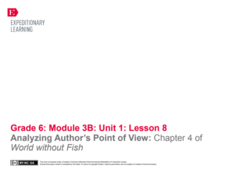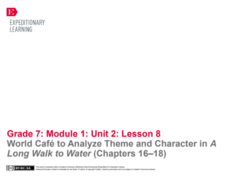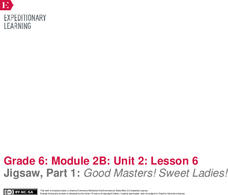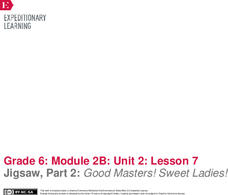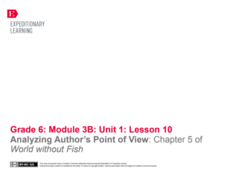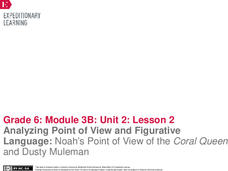EngageNY
Clarifying Thinking on Water Management: Revisiting the Gallery Walk
One, two, three, go! Scholars gather in triads and number themselves one to three. Each number is responsible for sharing a section of the map homework completed the night before as learners discuss domain-specific vocabulary terms using...
EngageNY
Inferring about Character: Close Reading of The Lightning Thief (Chapter 3)
Stick it to them! Scholars work to write the gist of sections of text on sticky notes and place them in chapter three of The Lightning Thief. They then share what they wrote with classmates in their triad. The group reads selections of...
EngageNY
Analyzing Author’s Point of View: Chapter 4 of World without Fish
Give me a clue. Scholars work in triads to use highlighters and mark clues that lead to the author's point of view in World without Fish. The Author’s Point of View graphic organizer helps them map out their thoughts.
VH1
Lesson 4: Behind the Movie Chicago
The elements of music and journalistic integrity in one instructional activity; What could be better? The class discusses journalistic approaches to better understand responsible reporting versus sensationalism. They watch the Act One...
EngageNY
World Café to Analyze Theme and Character in A Long Walk to Water (Chapters 16–18)
Here comes a surprise ending! Readers discuss their thoughts about the ending of A Long Walk to Water by answering probing questions. They participate in a World Café where they work in triads to complete a chart and a prompt during...
EngageNY
Forming a Research-Based Claim: Comparing Cascading Consequences
It's time to weigh the risks and benefits of screen time! Pupils work in triads to identify the strongest positive and negative consequences from their Cascading Consequences chart. Next, using the chart and their researcher's notebooks,...
EngageNY
Inferring about Character: Getting to Know Percy (Chapters 1 and 2)
What a character! Scholars look at two chapters in The Lightning Thief to make inferences about the character Percy. They record both the character's challenges and responses. Learners then work in their triads to discuss the gist of...
EngageNY
Vocabulary Strategies and Questions from the Text: Close Reading Part 2 of The Lightning Thief (Chapter 3, Continued)
That is very unexpected! Scholars take a close look at the word unexpectedly from chapter three of The Lightning Thief. They examine the prefix and think of other words that have the same prefix. Learners regroup in their triads and take...
EngageNY
Using Details to Determine Theme: The Myth of Cronus
There's nothing like a good theme! After reviewing the story of Cronus, learners participate in a mini instructional activity about theme by pulling papers from an envelope and identifying the writing on it as either a topic or a theme....
EngageNY
What Makes a Myth a Myth? Comparing “Cronus” and “Shrouded in Myth”
Scholars complete a Venn diagram to compare and contrast Cronus and Shrouded in Myth. Learners work in their triads to write similarities and differences on sticky notes. They then take a look at the text The Key Elements of Mythology to...
EngageNY
Building Vocabulary: Working with Words about the Key Elements of Mythology
Build vocabulary one word at a time. Scholars work to create word models to describe the key elements of myths. After viewing and discussing glossaries, they begin working in triads on their models that include the word, synonyms,...
EngageNY
Exploring Allusions to Myths in The Lightning Thief: Close Reading Part 1 of “Prometheus”
It's all just an allusion. Scholars learn the meaning of allusion and read an allusion in The Lightning Thief. Learners gather in their triads and discuss questions from the text to take a close look at vocabulary words and choose an...
EngageNY
Connecting the Theme of the Expert Group Myth to a Theme in The Lightning Thief and to Life Lessons
Expert groups discuss the theme of their myths and the life lessons people learn from it. They then regroup their triads so that there is a pupil from each expert myth group and share details about their myths. The class also talks about...
EngageNY
Jigsaw, Part 1: Good Masters! Sweet Ladies!
Complete a puzzle one piece at a time. Scholars gather in triads to complete jigsaw activities over a monologue from Good Masters! Sweet Ladies. They read as a group and independently and use sticky notes to identify the gist of each...
EngageNY
Jigsaw, Part 2: Good Masters! Sweet Ladies!
Three heads are better than one. Scholars gather back in their triads for another read of their monologues. They answer text-dependent questions and review their work. Learners then present their jigsaw monologues to the rest of the class.
EngageNY
Analyzing and Discussing: Modern Voices
This is the way we go to school. Scholars take a look at two poems about different ways to get to school, TyrannosaurBus Rex and Point A to Point B. Pupils work in triads to analyze the poem images and determine the theme.
EngageNY
Reading for Gist and Answering Text-Dependent Questions: Chapter 4 of World without Fish
True or false? Scholars read chapter four of World without Fish and explore the idea of a myth. They discuss in triads the meaning of the myth of nature’s bounty. Learners annotate the text on sticky notes and then answer text-dependent...
EngageNY
Analyzing Author’s Point of View: Chapter 5 of World without Fish
That's an interesting perspective. Scholars read chapter five of World without Fish and use an Author’s Point of View graphic organizer to determine the author's perspective. In triads, they highlight words that support the author's...
EngageNY
Analyzing Point of View and Figurative Language: Noah’s Point of View of the Coral Queen and Dusty Muleman
Literally, what's the meaning? Scholars read pages seven through nine of Flush and discuss literal and nonliteral meaning with figurative language. Learners work in triads to identify and define unfamiliar words. They then complete a...
EngageNY
Introducing World without Fish
One fish, two fish, red fish, no fish. Scholars analyze World without Fish to determine the gist, identify vocabulary, and answer text-dependent questions. As learners read, they use sticky notes to annotate the text. They also work in...
EngageNY
Introduction: The Ideas of Charles Darwin
Piece by piece ... Scholars read the text World without Fish by breaking the text into pieces. They identify challenging words and determine the gist of each section as they read. They then work together in triads to answer...
EngageNY
Tracing the Idea of Fish Depletion: Chapter 2
Scholars read chapter two of World without Fish to learn more about the fishing industry. Learners discuss in triads what it means for fishing to become an industry. They then write the gist of pages 28-33 on sticky notes and answer...
EngageNY
Researching Information about Sustainable Fishing
Go fish! Scholars continue using their research skills to find factual information to use in their consumer brochures about overfishing. They work in triads to research information about sustainable fishing practices and share their...
EngageNY
Researching Information about Overfishing
Imagine a world without Nemo and Dory. Using the resource, pupils engage in a jigsaw activity, working in triads to research information about overfishing. They watch a video about overfishing, complete a graphic organizer, read relevant...




